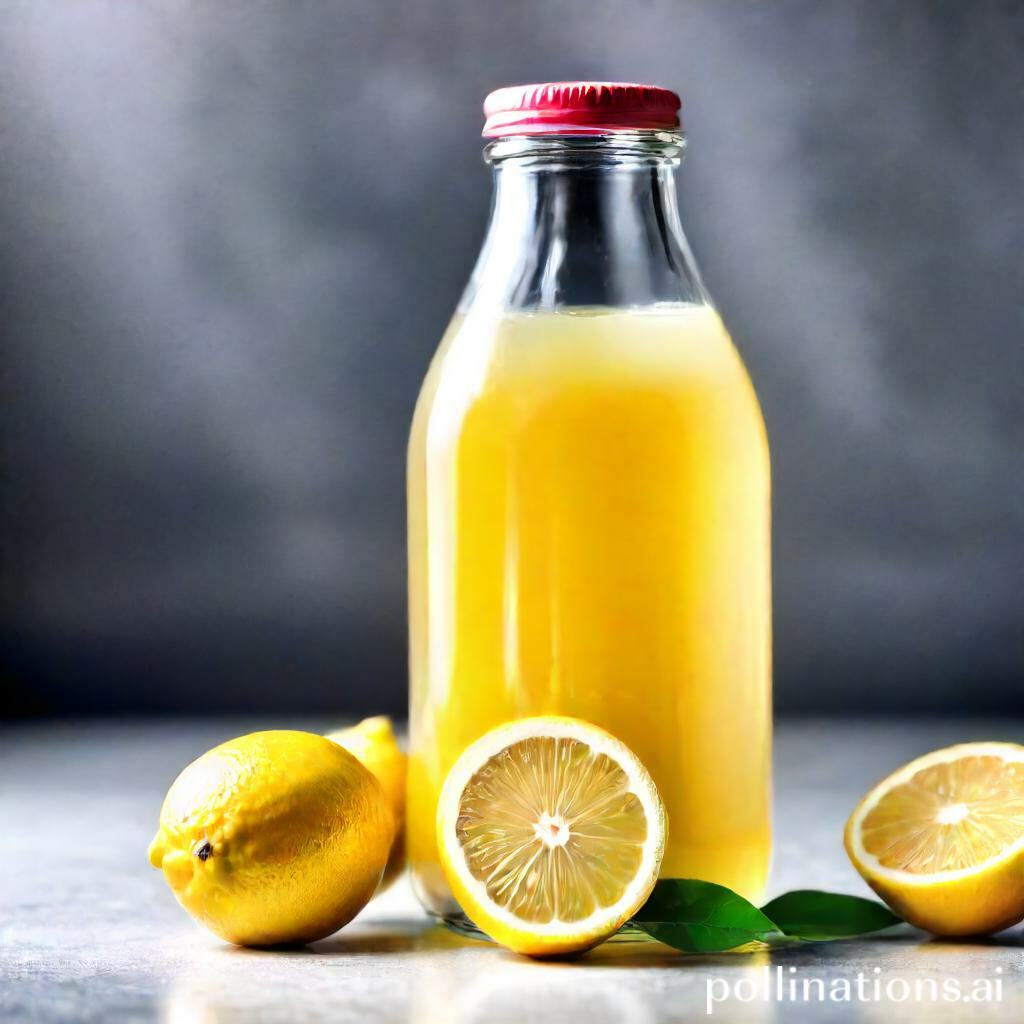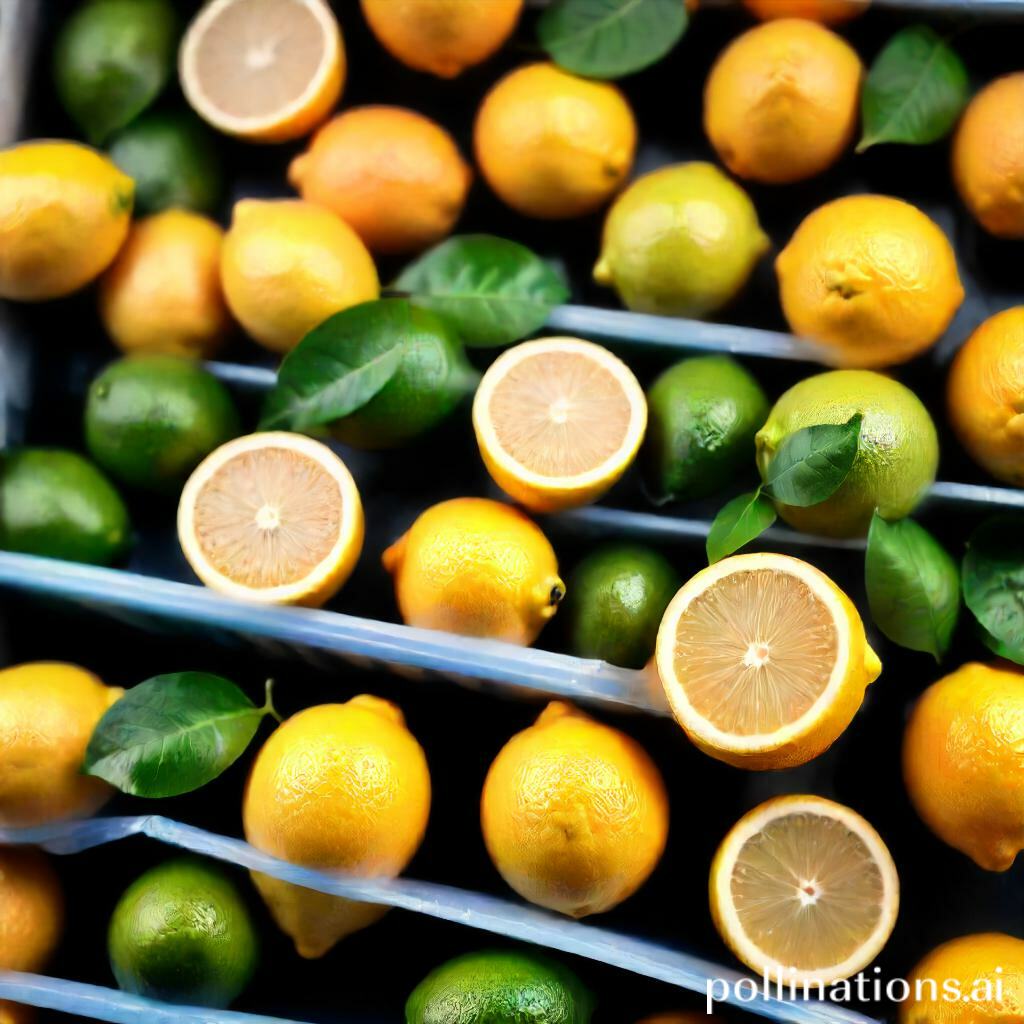Lemon juice does not need to be refrigerated after opening, but it is recommended to extend its shelf life. The acidity of lemon juice helps to prevent the growth of bacteria, so it can be stored at room temperature for a short period of time.
In contrast, refrigerating it will help to maintain its freshness and flavor for a longer period. Vital to keep the lemon juice tightly sealed and away from direct sunlight to prevent any degradation.
THE SCIENCE OF CITRUS: WHY LEMON JUICE QUALITY CHANGES
Natural composition of lemon juice
The intrinsic properties of lemon juice are pivotal to its quality and longevity. Rich in vitamin C (ascorbic acid), citric acid, and other phytochemicals, lemon juice is a veritable bastion of nutritional value. These compounds are responsible for its tart flavor, antioxidant capacity, and microbial growth inhibition. Although, the same constituents that confer health benefits also render lemon juice susceptible to quality degradation over time.
How exposure to air affects lemon juice
When lemon juice is exposed to air, a process known as oxidation commences. Oxidation leads to a gradual deterioration, affecting the juice’s flavor profile and nutrient content. The ascorbic acid, a potent antioxidant, begins to degrade, resulting in a reduction of vitamin C levels. This degradation not only diminishes the nutritional value but also alters the sensory attributes, such as taste and aroma, making the juice less palatable.
The role of temperature in preservation
Temperature regulation is crucial in preserving the integrity of lemon juice. Elevated temperatures accelerate the rate of enzymatic reactions and oxidation, hastening the loss of vitamin C and the breakdown of flavonoids. Conversely, storing lemon juice at lower temperatures can impede these processes, thereby extending its shelf life and maintaining its quality. The table below illustrates the optimal storage conditions for lemon juice to retain its freshness and nutritional profile:
| Storage Condition | Temperature Range | Expected Shelf Life |
|---|---|---|
| Room Temperature | 20-22°C (68-72°F) | 2-4 hours |
| Refrigerated | 3-4°C (37-39°F) | 2-3 days |
| Frozen | -18°C (0°F) or below | 3-4 months |

REFRIGERATION. A NECESSITY OR A CHOICE?
Refrigeration plays a vital role in preserving the freshness and quality of various food items, and lemon juice is no exception. In this section, we will pioneer the benefits of refrigerating lemon juice and its impact on shelf life and spoilage.
1. Comparing refrigerated vs. non-refrigerated lemon juice
One of the key factors to consider when deciding whether to refrigerate lemon juice is the difference in taste and quality. Refrigerating lemon juice helps retain its refreshing and tangy flavor, ensuring a more enjoyable experience when using it in various recipes or as a refreshing drink. In contrast, leaving lemon juice at room temperature for extended periods can lead to flavor deterioration and potential bacterial growth.
2. Shelf life of refrigerated lemon juice
3. Signs of spoilage in lemon juice
It is essential to be aware of signs that indicate lemon juice has spoiled. These include a sour or off-putting odor, a cloudy appearance, or the presence of mold. If you notice any of these signs, it is best to discard the lemon juice to avoid any potential health risks.
| Benefits of Refrigerated Lemon Juice | Drawbacks of Non-refrigerated Lemon Juice |
|---|---|
|
|
PROPER STORAGE TECHNIQUES FOR LEMON JUICE
Lemon juice is a versatile ingredient that adds a tangy flavor to various dishes and beverages. To ensure its freshness and maximize its shelf life, proper storage techniques are crucial. Here are some tips to help you store lemon juice effectively:
1. Best containers for storing lemon juice
In regard to storing lemon juice, it is essential to choose the right containers. Glass containers with tight lids are ideal for preserving the freshness and flavor of the juice. Avoid using plastic containers, as they can absorb odors and affect the taste of the juice.
2. The importance of sealing and airtight storage
To maintain the quality of lemon juice, it is crucial to seal the containers tightly. Exposure to air can lead to oxidation, which can degrade the flavor and color of the juice. Make sure the lids of the containers are airtight to prevent any air from entering.
3. Tips for extending the freshness of lemon juice
To extend the freshness of lemon juice, consider the following tips:
- Refrigeration: Store the lemon juice in the refrigerator at a temperature between 35°F and 40°F. This helps slow down the degradation process and keeps the juice fresh for a longer time.
- Use dark-colored containers: Light can also affect the quality of lemon juice. Opt for dark-colored containers or store the juice in a cool, dark place to minimize exposure to light.
- Freezing: If you have a surplus of lemon juice, consider freezing it in ice cube trays. This allows you to portion out the juice and thaw only what you need, in the course of keeping the rest fresh.
- Labeling and dating: Properly label the containers with the date of storage. This ensures you can keep track of the freshness and use the oldest juice first.

THE IMPACT OF REFRIGERATION ON LEMON JUICE NUTRIENTS
In this section, we will ponder the effects of refrigeration on the nutrients found in lemon juice. Specifically, we will focus on the stability of vitamin C, the impact on acidity and pH levels, and the preservation of antioxidants.
1. Vitamin C stability in cold storage
The first aspect we will examine is the stability of vitamin C when lemon juice is subjected to cold storage. Vitamin C is a sensitive nutrient that can degrade when exposed to heat or air. Albeit, refrigeration can help preserve the vitamin C content in lemon juice, ensuring that you receive its full benefits when consuming it.
2. Does refrigeration affect the acidity and pH levels?
Another important consideration is the impact of refrigeration on the acidity and pH levels of lemon juice. Lemon juice is known for its acidic properties, which contribute to its tangy taste. When refrigerated, the acidity and pH levels of lemon juice remain relatively stable, allowing you to enjoy its refreshing flavor without any significant alteration.
3. Keeping the antioxidants intact
Lemon juice contains antioxidants that provide numerous health benefits. These antioxidants help protect your body against harmful free radicals and oxidative stress. Refrigeration can help preserve these antioxidants, ensuring that you receive the maximum nutritional value from your lemon juice.
| Nutrient | Impact of Refrigeration |
|---|---|
| Vitamin C | Stability is maintained |
| Acidity and pH levels | Remain relatively stable |
| Antioxidants | Preserved for maximum benefits |

ALTERNATIVES TO REFRIGERATION. FREEZING AND OTHER METHODS
In this section, we will traverse alternative methods to refrigeration for preserving food, focusing specifically on freezing and other effective preservation techniques.
1. How to Freeze Lemon Juice Effectively
Lemon juice can be easily frozen to extend its shelf life and ensure its freshness for future use. Follow these steps to freeze lemon juice effectively:
- Extract fresh lemon juice and strain it to remove any pulp or seeds.
- Pour the lemon juice into ice cube trays, filling each compartment about halfway.
- Place the ice cube trays in the freezer and allow the lemon juice to freeze completely.
- Once frozen, transfer the lemon juice cubes into a freezer-safe container or bag for long-term storage.
- Label the container with the date of freezing to keep track of its freshness.
2. Shelf Life of Frozen Lemon Juice
Frozen lemon juice can be stored in the freezer for up to six months without significant loss of flavor or quality. That being said, it is recommended to use the frozen lemon juice within three months for the best taste.
3. Other Preservation Methods and Their Effectiveness
In addition to freezing, there are various other methods for preserving food that do not require refrigeration. Some effective alternatives include:
- Canning: This process involves sealing food in airtight jars or cans after proper preparation and cooking.
- Drying: Dehydrating food removes moisture, inhibiting the growth of bacteria and other microorganisms.
- Pickling: Immersing food in a solution of vinegar, salt, and spices helps prolong its shelf life and adds flavor.
| Preservation Method | Effectiveness |
|---|---|
| Freezing | Highly effective for preserving the freshness and flavor of many foods. |
| Canning | Provides long-term preservation for a wide range of foods. |
| Drying | Effective for preserving fruits, vegetables, and herbs. |
| Pickling | Offers extended shelf life and adds tangy flavors to various food items. |
Faq about Lemon Juice Preservation
FAQ 1: How long can lemon juice last after opening without refrigeration?
Lemon juice can last for about 2 to 4 days after opening without refrigeration. That being said, to maintain its freshness and extend its shelf life, it is recommended to store it in the refrigerator.
FAQ 2: Can you freeze lemon juice in ice cube trays?
Yes, you can freeze lemon juice in ice cube trays. Freezing lemon juice in ice cube trays is a convenient way to preserve it for longer periods. Once frozen, transfer the lemon juice cubes to a freezer-safe container or bag for better storage.
FAQ 3: Is it safe to drink cloudy lemon juice?
Cloudy lemon juice is safe to drink. The cloudiness is often caused by natural pectin particles present in the lemon juice. It does not indicate spoilage or any harm to consume. Despite this, if the lemon juice has an off smell or taste, it is best to discard it.
FAQ 4: How can you tell if lemon juice has gone bad?
You can tell if lemon juice has gone bad by examining its color, smell, and taste. If the lemon juice has darkened in color, developed an off smell, or tastes sour or spoiled, it is an indication that it has gone bad and should be discarded.
FAQ 5: Does the type of container affect the shelf life of lemon juice?
Yes, the type of container can affect the shelf life of lemon juice. It is recommended to store lemon juice in glass or plastic containers that are tightly sealed to prevent air and moisture from entering. This helps to maintain its freshness and prolong its shelf life.
Bottom Line
In regard to storing lemon juice, refrigeration is key. Once opened, fundamental to keep lemon juice refrigerated to maintain its freshness and prevent spoilage. The cool temperature helps to preserve its flavor and extend its shelf life. Remember to always store it in a sealed container to prevent any contamination. So, whether you use it for cooking, baking, or adding a tangy twist to your drinks, make sure to keep your lemon juice chilled for optimal taste and quality.
Don’t let your lemon juice go to waste – refrigerate it and enjoy its refreshing zing for longer!

